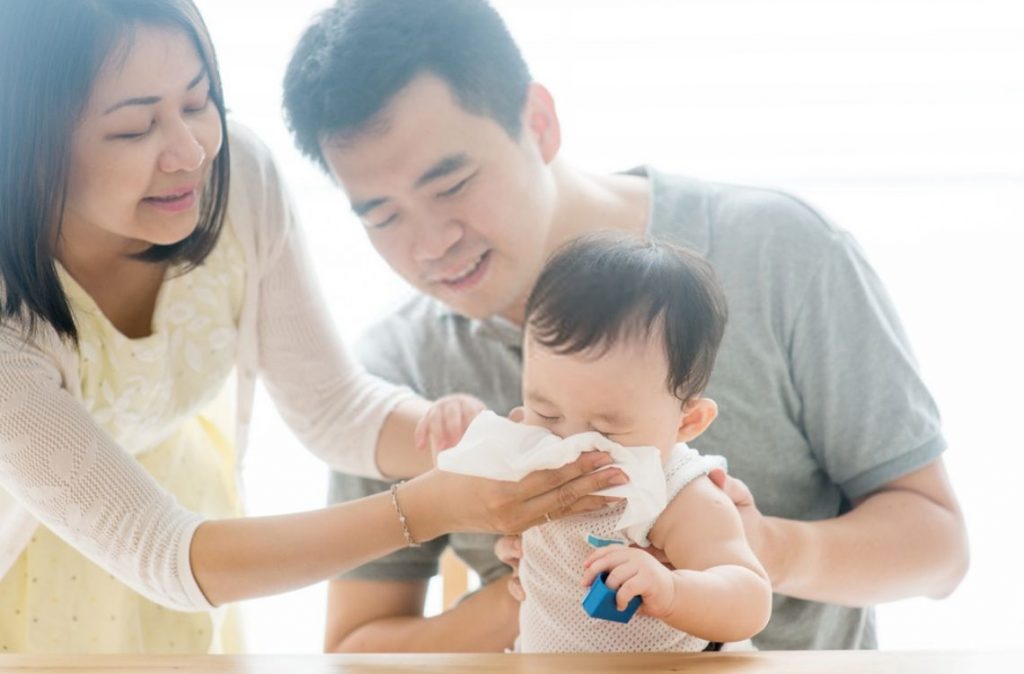A common cold is a viral infection which affects your baby’s upper respiratory tract – the nose and throat. The first thing you would notice when your baby has a cold is a runny nose and nasal congestion. Babies have particularly immature immune systems, making them especially susceptible to the common cold. Within the first year of life, most babies have up to seven bouts of colds.
Dealing with the common cold in babies mostly involves taking steps to ease their symptoms. This would include providing plenty of fluids and keeping the air moist. Very young infants must see a doctor at the first sign of the common cold because they’re at higher risk of health complications such as croup or pneumonia.
Common Cold In Babies? How To Deal With It?
Symptoms
Signs that your baby might be having a cold include:
- A congested or runny nose.
- Decreased appetite.
- Sneezing and coughing.
- Nasal discharge that may initially appear clear but turns thicker and yellowish or greenish.
- A low-grade fever of about 100.4ºF (38ºC)
- Coughing.
- Irritability.
- Difficulty sleeping.
Causes
The common cold is caused by one of more than 100 viruses where the rhinovirus and coronavirus are common culprits and are highly contagious. Once infected by a virus, the body generally becomes immune to that specific virus. However, many viruses cause colds, so expect that your child may have several bouts of colds a year.
A common cold virus enters your baby’s body through his or her mouth or nose by:
Air
- When your baby is situated near a sick person who coughs or sneezes.
Direct contact
- The cold virus is easily spread, for example, when someone who is sick touches his or her mouth or nose, and then touches your baby’s hand. Your baby can then become infected by touching his or her own eyes, nose or mouth.
Touching contaminated surfaces
- Your baby may catch a virus by touching a contaminated surface, such as the floor, tabletop, or even a toy.
Immature immune systems
- Infants are particularly at risk of catching a common cold because they have yet to develop resistance to most of the cold-causing viruses.
Exposure to other children
- Babies and toddlers who spend a lot of time in the company of other children are much more susceptible to the common cold. The same goes for babies who have older school-going siblings.
Side Effects
Acute Ear Infection (Otitis Media)
- Between 5 and 15 per cent of children who have a common cold develop ear infections. Ear infections occur when bacteria or viruses infiltrate the space behind the eardrum.
Wheezing
- A cold can trigger wheezing, even if your child doesn’t have asthma.
Sinusitis
- Inflammation and infection of the sinuses.
Other secondary infections may include strep throat (streptococcal pharyngitis), pneumonia, bronchiolitis and croup. Such infections need to be evaluated and treated by a doctor.
When To Consult The Doctor?
A baby’s immune system needs more time to get over a cold compared to an adult’s. If your baby has a cold with no complications, it should be resolved within a week.
If your baby is younger than three months of age, call the doctor at the first sign of a cold. For newborns especially, a common cold can quickly develop into croup, pneumonia or another serious illness. In any case, a stuffy nose can make it difficult for your baby to nurse or drink from a bottle. This can lead to dehydration.
Most colds are nothing more than an inconvenience and nuisance, but when it comes to little children, it’s important always to practise caution. If your baby is three months or older, call the doctor if you observe the following:
- Drier diapers than usual (less urinating)
- A temperature higher than 102ºF (38.9 ºC)
- Apparent ear pain
- Red eyes or yellow eye discharge
- A cough that lasts for more than one week
- Thick, green nasal discharge for more than two weeks
- Refusal to nurse or accept fluids
- Coughs that are severe enough to cause vomiting or changes in skin colour
- Coughs with blood-tinged sputum
- Breathing difficulties or is bluish around the lips and mouth
How To Prevent It?
The common cold is an airborne disease so basically practising good personal hygiene such as hand-washing before handling your baby is important. Nutrition is important, so continue to breastfeed your baby as breast milk has natural antibodies to protect your child.
If there is a flu outbreak, avoid crowded areas such as shopping malls/playgrounds as there is a higher chance of getting infected in these areas. Should there be an outbreak in the nursery or daycare centres, it is advisable not to send your child to the centre temporarily.
There you go! We hope our tips and tricks be able to help you prevent the common cold in babies. Caring for a sick little one is rather hard as their constant crying may make you worried more than you should. The best way is to make sure your house is always clean and spotless from any germs. That will lessen the risk for your little one to get infected by the common cold.
Stay tuned for more health tips and tricks on our blog. Make sure to check out Motherhood.com.my for the best quality baby items that cater specially for your little one!
